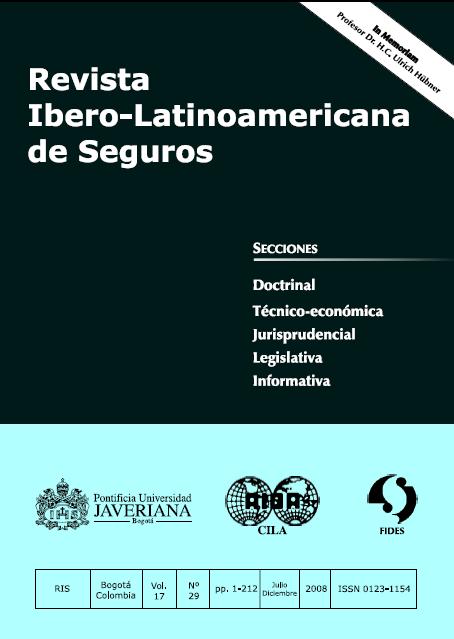Abstract
After an initial analysis of “insurance intermediary” from the legislative, jurispruden- tial and doctrine viewpoint in Colombia, several approaches are made as to its juridical nature by trying to determine whether it is an autonomous and indepen- dent institution or if on the contrary it is configured within other contractual forms. The importance of clearly identifying the existence of an intermediation juridical act with its own set of obligations as well as of the need to present the professional character of the insurance intermediary regardless of its type is notable which results in a more rigorous analysis as to its contractual liability. Different existing theories as to the juridical nature of insurance intermediaries are revised as well similarities with other institutions such as mandate or services agreements. With that approach, the most significant aspects are revised according to the different types of intermediary, analyzing whether representation takes place or not as one of its characteristic elements. On the other hand, difficulties of legislation and practice in Colombia as to juridical nature of the insurance intermediary are presented which is the case for example with the recent amendment introduced to the Public Contracts Law (Law 1150 of 2007 and Decree 2474 of 2008).
This journal is registered under a Creative Commons Attribution 4.0 International Public License. Thus, this work may be reproduced, distributed, and publicly shared in digital format, as long as the names of the authors and Pontificia Universidad Javeriana are acknowledged. Others are allowed to quote, adapt, transform, auto-archive, republish, and create based on this material, for any purpose (even commercial ones), provided the authorship is duly acknowledged, a link to the original work is provided, and it is specified if changes have been made. Pontificia Universidad Javeriana does not hold the rights of published works and the authors are solely responsible for the contents of their works; they keep the moral, intellectual, privacy, and publicity rights.
Approving the intervention of the work (review, copy-editing, translation, layout) and the following outreach, are granted through an use license and not through an assignment of rights. This means the journal and Pontificia Universidad Javeriana cannot be held responsible for any ethical malpractice by the authors. As a consequence of the protection granted by the use license, the journal is not required to publish recantations or modify information already published, unless the errata stems from the editorial management process. Publishing contents in this journal does not generate royalties for contributors.


